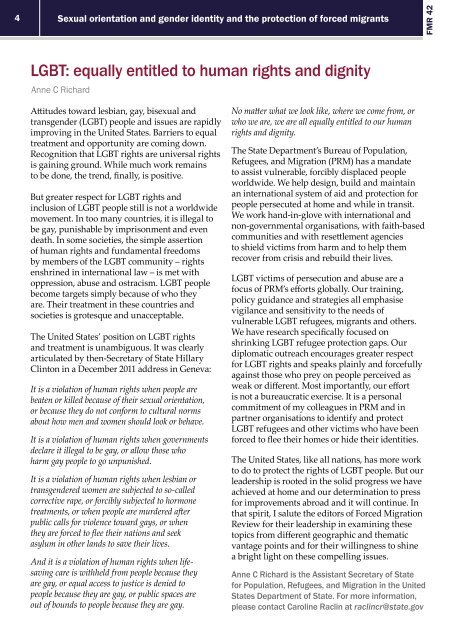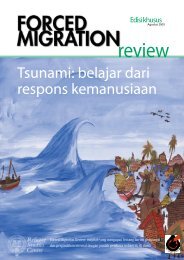FMR 42 full issue pdf - Forced Migration Review
FMR 42 full issue pdf - Forced Migration Review
FMR 42 full issue pdf - Forced Migration Review
You also want an ePaper? Increase the reach of your titles
YUMPU automatically turns print PDFs into web optimized ePapers that Google loves.
4 Sexual orientation and gender identity and the protection of forced migrants<br />
<strong>FMR</strong> <strong>42</strong><br />
LGBT: equally entitled to human rights and dignity<br />
Anne C Richard<br />
Attitudes toward lesbian, gay, bisexual and<br />
transgender (LGBT) people and <strong>issue</strong>s are rapidly<br />
improving in the United States. Barriers to equal<br />
treatment and opportunity are coming down.<br />
Recognition that LGBT rights are universal rights<br />
is gaining ground. While much work remains<br />
to be done, the trend, finally, is positive.<br />
But greater respect for LGBT rights and<br />
inclusion of LGBT people still is not a worldwide<br />
movement. In too many countries, it is illegal to<br />
be gay, punishable by imprisonment and even<br />
death. In some societies, the simple assertion<br />
of human rights and fundamental freedoms<br />
by members of the LGBT community – rights<br />
enshrined in international law – is met with<br />
oppression, abuse and ostracism. LGBT people<br />
become targets simply because of who they<br />
are. Their treatment in these countries and<br />
societies is grotesque and unacceptable.<br />
The United States’ position on LGBT rights<br />
and treatment is unambiguous. It was clearly<br />
articulated by then-Secretary of State Hillary<br />
Clinton in a December 2011 address in Geneva:<br />
It is a violation of human rights when people are<br />
beaten or killed because of their sexual orientation,<br />
or because they do not conform to cultural norms<br />
about how men and women should look or behave.<br />
It is a violation of human rights when governments<br />
declare it illegal to be gay, or allow those who<br />
harm gay people to go unpunished.<br />
It is a violation of human rights when lesbian or<br />
transgendered women are subjected to so-called<br />
corrective rape, or forcibly subjected to hormone<br />
treatments, or when people are murdered after<br />
public calls for violence toward gays, or when<br />
they are forced to flee their nations and seek<br />
asylum in other lands to save their lives.<br />
And it is a violation of human rights when lifesaving<br />
care is withheld from people because they<br />
are gay, or equal access to justice is denied to<br />
people because they are gay, or public spaces are<br />
out of bounds to people because they are gay.<br />
No matter what we look like, where we come from, or<br />
who we are, we are all equally entitled to our human<br />
rights and dignity.<br />
The State Department’s Bureau of Population,<br />
Refugees, and <strong>Migration</strong> (PRM) has a mandate<br />
to assist vulnerable, forcibly displaced people<br />
worldwide. We help design, build and maintain<br />
an international system of aid and protection for<br />
people persecuted at home and while in transit.<br />
We work hand-in-glove with international and<br />
non-governmental organisations, with faith-based<br />
communities and with resettlement agencies<br />
to shield victims from harm and to help them<br />
recover from crisis and rebuild their lives.<br />
LGBT victims of persecution and abuse are a<br />
focus of PRM’s efforts globally. Our training,<br />
policy guidance and strategies all emphasise<br />
vigilance and sensitivity to the needs of<br />
vulnerable LGBT refugees, migrants and others.<br />
We have research specifically focused on<br />
shrinking LGBT refugee protection gaps. Our<br />
diplomatic outreach encourages greater respect<br />
for LGBT rights and speaks plainly and force<strong>full</strong>y<br />
against those who prey on people perceived as<br />
weak or different. Most importantly, our effort<br />
is not a bureaucratic exercise. It is a personal<br />
commitment of my colleagues in PRM and in<br />
partner organisations to identify and protect<br />
LGBT refugees and other victims who have been<br />
forced to flee their homes or hide their identities.<br />
The United States, like all nations, has more work<br />
to do to protect the rights of LGBT people. But our<br />
leadership is rooted in the solid progress we have<br />
achieved at home and our determination to press<br />
for improvements abroad and it will continue. In<br />
that spirit, I salute the editors of <strong>Forced</strong> <strong>Migration</strong><br />
<strong>Review</strong> for their leadership in examining these<br />
topics from different geographic and thematic<br />
vantage points and for their willingness to shine<br />
a bright light on these compelling <strong>issue</strong>s.<br />
Anne C Richard is the Assistant Secretary of State<br />
for Population, Refugees, and <strong>Migration</strong> in the United<br />
States Department of State. For more information,<br />
please contact Caroline Raclin at raclincr@state.gov




